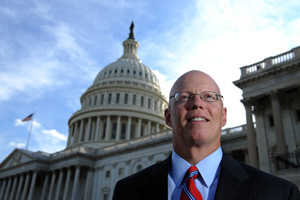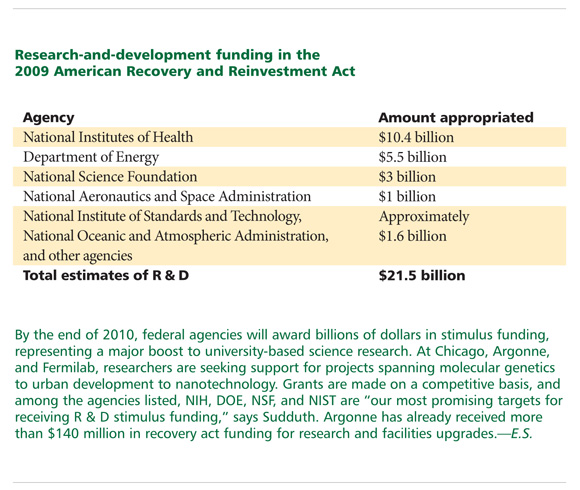Capitol project
As the University’s first federal lobbyist, Scott Sudduth coordinates Chicago’s response to the economic stimulus plan.
By Elizabeth Station
Photography by Dan Dry
Two years ago, when Scott Sudduth first heard that the University of Chicago wanted to raise its profile in Washington, DC, he wasn’t sure that the next U.S. president would have University connections. Now, Sudduth jokes, his decision to become Chicago’s associate vice president for federal relations last June “makes me one of the smartest lobbyists inside the Beltway.”
He may also be one of the busiest. In his first year, Sudduth hired two staffers and set up an office at 1730 Pennsylvania Avenue—“as close to the White House as you can get without having security clearance,” he says with a grin. When Barack Obama took office, Sudduth’s team organized an alumni gala and made sure University administrators, trustees, and students were represented at Obama’s swearing-in and the Illinois inaugural ball. Soon after, the American Recovery and Reinvestment Act appropriated $21.5 billion in funding for research and development. Sudduth worked with the vice president for research and national laboratories’ office to alert Chicago researchers, via a new Web site, about the latest federal grant competitions.

Our man in DC: Sudduth helps Chicago researchers navigate the Beltway bureaucracy.
Sudduth’s portfolio is standard issue for higher-education lobbyists, but before his hire, Chicago was one of the few top-tier universities without a full-time registered representative in Washington. American educational institutions spent more than $102 million on federal lobbying last year. Colleges and universities were the biggest spenders, whether they aimed to win funds for research projects, influence lawmakers voting on student-loan legislation, or add their voice to national policy debates. Chicago mostly left the field to other players until 2003, when new rules forced the University to bid competitively for its long-held Department of Energy contract to manage Argonne National Laboratory. The threat of losing the contract—and the $900 million in federal funding that Argonne and Fermilab generate annually—made it clear to University officials, Sudduth says, that they needed to pay closer attention to Washington politics.
They tapped Sudduth, 50, who spent the previous decade as the University of California system’s top lobbyist, representing ten campuses and three national laboratories. Earlier he established the first governmental-relations office for the University of Texas system, his undergraduate alma mater. He also worked as an aide to Senator Lloyd Bentsen and U.S. Representative Pete Geren, honing an amiable, straight-shooting style between Texas and Capitol Hill. Even now Sudduth sometimes wears cowboy boots under his business suit.
Although trained as a lawyer, Sudduth says, “my special interest is higher education in science.” As Chicago pursues stimulus funding, he’ll have ample opportunity to advocate for that cause. The recovery act supports research on biomedicine, energy efficiency, climate change, and economic competitiveness. Faculty interest in the money is robust: by June Chicago researchers had submitted nearly 600 individual applications for $345 million in awards, mostly from the National Institutes of Health (NIH). As other agencies detail plans for disbursing funds, the University also intends to submit institutional proposals for major grants.
As stimulus awards are made over the coming year, universities around the country hope to boost research budgets. “We’ve been in an environment of no growth, and now we have suddenly been hit with this enormous infusion of R & D funding,” says Sudduth. “The good news is that in most cases the U.S. research enterprise has the capacity to absorb this.”
The bad news is that there may be downsides to stimulus funding—like red tape. “For a principal investigator accustomed to receiving NIH grants and following the byzantine rules for tracking the use of those federal funds,” Sudduth explains, “she now has to learn a different set of rules and establish different accounts for tracking stimulus funds.”
Another potential sticking point is that the recovery act’s primary goal is to create jobs, not spur scientific discovery. In two years, when stimulus projects wrap up, “will success be defined by the number of construction, lab technician, and faculty jobs created—or by advances in biology, climate change, and alternative fuels?” Sudduth asks. For universities, “it’s going to be a clash of accounting systems and cultures.”

Helping academics navigate the federal bureaucracy is one of an education lobbyist’s key roles; gaining access to insiders who will push the university’s agenda is another. With Obama as president, Sudduth has found that Chicago connections can be a double-edged sword. As the debate over health-care reform has unfolded, for example, “every dean of a major medical center in the country knows that Michelle Obama worked at the Medical Center. They know that Eric Whitaker [MD’93], an officer of the University, is close to the White House.”
So when colleagues at academic medical centers want their message heard in Washington, “they come to us,” says Sudduth. “Expectations that we will fix the problems are high.” In reality, the administration’s strict rules on lobbying have created barriers for all registered lobbyists, including Sudduth. Given those circumstances and media scrutiny, his strategy is “to be very judicious about the relationships [we] have.”
Shuttling between Hyde Park, Argonne, Fermilab, and Washington, Sudduth nevertheless manages to carve out a personal life. He and his wife, Alice, a veterinarian, live with their two small boys on a farm outside Harpers Ferry, West Virginia. It’s a 75-minute commute to downtown DC, but the scenery is familiar. Sudduth’s family has lived in the Shenandoah Valley for eight generations.
Maintaining a physical distance from the Beltway may have helped Sudduth to keep his idealism. He sees a strong connection between education and public service. At home he serves on the local school board. At work, among his proudest accomplishments was helping Chicago become one of the first private universities to commit to participating in the Yellow Ribbon Program, a federal initiative to expand education benefits for post-9/11 veterans. A major perk of his job is that “it’s like never having left college. You’re around people who are engaged in new ideas, in learning,” he says. “I wouldn’t say it’s daunting, but it keeps you on your toes.”
Return to top